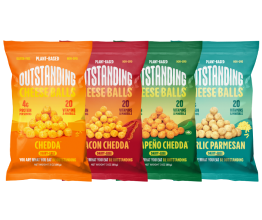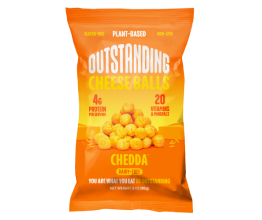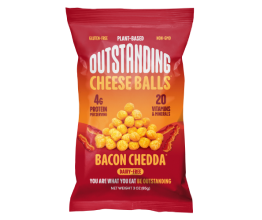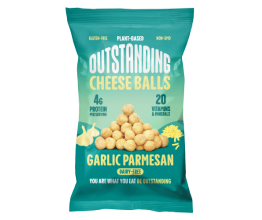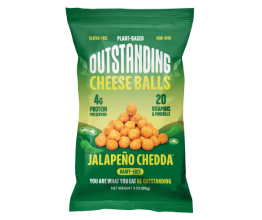Why Protein-Packed Snacks Matter: A Macro Crash Course
Counting macros has become big these days, especially in the world of weight loss. But what are macros? Do macros really matter for weight loss? And why is it so important to choose protein packed snacks?
Nutrients come in two categories: micronutrients and macronutrients. As the name implies, micronutrients are nutrients that your body needs in smaller amounts. Macronutrients, or macros for short, are nutrients that your body requires in large amounts.
The three macros are proteins, carbohydrates, and fats. Macronutrients provide the body with energy, and we measure that energy in calories. Some protein packed snacks contain your exact daily macro needs, so you don’t have to worry about counting and measuring. In the right ratios, these three macronutrients can improve your overall physical well-being.
How? Let's break down each macronutrient to see how it works. Then, we’ll give you some of our favorite ideas for macro-perfect, protein packed snacks.
The Three Types of Macronutrients
The macronutrients in food provide a person with the building blocks needed to grow and function. All macros provide valuable energy to the body, but each one functions differently.
Protein
Protein is used to build, repair, and maintain muscle tissue. It is often your last resort for daily energy. Several amino acids make up protein. Your muscles, cells, and even DNA are all made up of proteins. Protein is primarily found in foods like dairy, eggs, fish, beef, and poultry.
Protein is also what helps your body to get full and stay that way. That’s why it’s important to select protein packed snacks over carb-heavy ones when you’re fueling up on the go.
Carbohydrates
Carbohydrates (carbs) are a quick source of energy for your body. They’re the body's favorite source of fuel because they can easily be broken down into glucose or sugar. From there, the body can use these sugars for energy or store them in your muscles and liver as glycogen.
Carb intake varies from one person to another depending on a number of factors: activity level, body weight, muscle mass, and overall health are a few of the most common.
Fat
Fat is actually one of the most important macronutrients. Fat helps your body to absorb vitamins and regulate hormones. It also allows you to build cell membranes in your body.
However, fats are the most calorie dense nutrient available. While there are many types of fats (from saturated to monounsaturated to polyunsaturated), you should focus on avoiding trans fats because they pose risks to your heart. Try to instead consume greater quantities of heart-friendly omega-3 fatty acids (these are often found in fish).
How To Choose the Right Macro Ratio
Instead of solely focusing on counting calories, macro diets put emphasis on counting and tracking macronutrients. These diets aim to ensure that you consume a certain percentage of your daily calories from each macronutrient.
These ratios, often called “splits,” come in many variations depending on fitness goals and lifestyle. Bodybuilders, for example, tend to eat more protein, while runners tend to prioritize carbs. Different body types also require different splits, and it’s important to listen to your body as you’re experimenting with different macro ratios. There is no one-size-fits-all macro ratio.

It's also important to remember that your macros should be tailored to your personal needs. When you’re trying to lose weight, it’s best to keep your carbs low because they turn into fat if they’re not used.
On the other hand, when you’re trying to bulk up and gain muscle, it's best to up your carbs and fat — about 40–60% carbs and 20–40% fat. When it comes to protein, you should always try to get at least 0.7–0.9 grams of protein per pound of bodyweight. So, a 150 lb person should aim for 120–135 grams of protein each day.
If you're not sure where to start, aim for the common 50-30-20 split of proteins, carbs, and fats. You can decide which macro takes up 50% of your diet and switch it up if you’re not seeing positive results. If you do this consistently over time and listen to your body, you’ll be able to find your body’s natural equilibrium and perfect macro ratio.
How To Track Your Macros
Are you eating mostly meat and vegetables? Maybe you could use some more carbs. Do most of your meals contain foods like rice, pasta, or bread? You might be overdoing it on the carbs and a bit lacking on protein. Wherever you start, you need to learn how to determine how many proteins, carbs, and fats you’re consuming each day.
Start by using a macro tracker like MyFitnessPal to record what you eat each day. This will give you an idea of what your current macro split looks like. From there, you can compare different kinds of foods and plan meals that will meet your macro goals. With time, you can change and adapt your diet to the split that feels best for your body.
Finding your macros is a fine balance of trial and error that takes a lot of patience and self-control. The great news is that this doesn’t have to be as daunting as it sounds! The following tips can help you find the perfect macro diet to meet your goals.
Tips To Meet Your Macros in Your Daily Meals
Macros are one of the best-kept secrets to successful dieting, but you have to work to maintain a consistent ratio! That means putting in the time and effort on your part. If you're currently struggling to meet your macros daily or looking to take your results to the next level, here are some tips to get you there:
- Don't mistake “complete” for “optimal” when it comes to protein. Even though animal proteins like meat, fish, and eggs are considered “complete,” other sources like tofu, legumes, and dairy can still help you to still meet your daily protein requirements.
- Try adding a protein shake to your diet as an additional supplement (never as a meal substitute). This will help you to satisfy unhealthy cravings while reaching your protein goals for the day.
- Establish a routine. Many people find success in consistency — eating oatmeal and eggs every morning, for example. Finding a meal you love that meets your goals removes the temptation to eat something unhealthy when it’s meal time.
- Don't forget your water! You should be getting plenty of it every day to keep yourself hydrated and energized. If you overlook your water intake, you could find yourself feeling sluggish much quicker than normal.
The easiest place to start when looking at macros is to make sure that you're eating enough protein. Protein is what keeps you feeling fuller, longer. It’s also the basis of muscle development and essential to maintain good health.
Easy, Protein Packed Snacks
One of the greatest challenges in any diet is that you need to prepare your own food. That takes both time and creativity. Most foods that are ready to eat and available in stores are refined, heavily processed, and won’t match your macros.
Replace those snacks with these easy, healthy, protein packed snacks that you can do in five minutes or less!

Greek Yogurt With Fresh Berries
Ingredients: 1 container Greek yogurt, 1/2 cup mixed berries, 2 tbsp chia seeds (optional)
Directions: Combine yogurt with berries and chia seeds. Mix well and enjoy.
Cottage Cheese And Fruit
Ingredients: 1 cup nonfat cottage cheese, 1 cup mixed berries (frozen or fresh), 2 tbsp ground flaxseed (optional)
Directions: Combine all ingredients in a bowl and enjoy.
Protein Shake With Almond Milk
Ingredients: 12 oz almond milk, 1 scoop protein powder, 3 ice cubes
Directions: Combine ingredients in a blender and mix until smooth.
Outstanding Foods Puffs
Ingredients: Our Outstanding Puffs pack in 21g of plant protein made up of 20 essential minerals including Calcium and Iron, not to mention essential vitamins like B12, D, and C!
Directions: add a variety pack of our Outstanding Puffs to your cart here, and we will ship them to your door!
Protein Packed Chips or Bars
Protein packed packaged foods can be fantastic or fatal. When purchasing foods that have been designed to pack a punch of protein, be sure to check the ingredients to make sure that you’re not eating things that are harmful to your body. When you find a good one, though, it’s the easiest snack there is: buy, open, eat, rejoice.
Kick off Your Macro Diet With Protein Packed Snacks
Your body needs macronutrients to function properly, so it's important that you're getting enough of them. Luckily, snacking is one quick and easy way for you to do just that.
Outstanding Foods is dedicated to making snacks that help you to reach your goals — without unhealthy fillers. Find our protein packed snacks in a store near you.
For more information about how macros can help you reach your goals, follow us on Instagram and Twitter.
